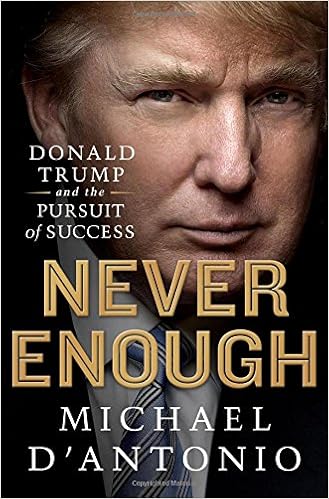by DEBORAH FRIEDELL
 IMAGE/Amazon
IMAGE/Amazon
Never Enough: Donald Trump and the Pursuit of Success by Michael D’Antonio Thomas Dunne, 389 pp, £18.00
Tom Sawyer cheats to win a Bible that he doesn’t want. He pretends to have memorised two thousand verses of the New Testament so that he can appear ‘great and conspicuous’. He’s undone when he’s asked to name the first two disciples. When Donald Trump said that the Bible was his favourite book, and then was asked by a reporter to name his favourite verse, he couldn’t lose because he refused to play: ‘I wouldn’t want to get into it because to me that’s very personal. You know, when I talk about the Bible it’s very personal. So I don’t want to get into verses, I don’t want to get into – the Bible means a lot to me, but I don’t want to get into specifics.’ At the moment, Trump claims more support among Evangelical Christians than any other potential candidate for president. Evangelicals like what he has said about abortion (‘I’m very, very pro-life’) and Obamacare (he’s promised to replace it with ‘something terrific’). And they like his assurance that when he’s elected president, God willing, he’ll compel shop assistants to go back to saying ‘Merry Christmas’ instead of ‘Happy Holidays’. But ask Trump’s supporters what they like most about him, and they say it’s the man himself. Like the gossips of St Petersburg, Missouri who think that Tom Sawyer ‘would be president, yet, if he escaped hanging’, they admire his chutzpah.
In 1885, Mark Twain published The Adventures of Huckleberry Finn and Friedrich Drumpf, apprentice barber, arrived in New York Harbor from the village of Kallstadt in south-west Germany (Donald, who has a lot of Jewish business associates, claims in his memoir that his grandfather was Swedish). Friedrich did well selling horsemeat in the Klondike during the gold rush, running saloons and, very probably, brothels. But he was an alcoholic and died young. His oldest son, Frederick, Donald’s father, went to work as a builder while he was still a teenager. He built his first house in Queens for a little less than $5000, then sold it for $7500. He used the profits to build another house, then another. The buildings were solid enough, but his real genius lay in sussing out tax breaks and abatements, in availing himself of federal programmes that would pay him to keep building houses during the Depression, then apartment blocks for naval bases during the war, then entire neighbourhoods – Trump Village, Shore Haven, Beach Haven – for veterans returning to Brooklyn. According to Michael D’Antonio’s delightful new biography, one of Trump père’s schemes was to create an ‘independent company to buy used equipment’ – everything needed on a building site, excavators, tile machines – which he would then lease to his own projects for ‘as much as twenty times their actual cost’: he’d buy a truck for $2600, then rent it to himself for $21,000.
…
It’s not just vanity that requires Trump to claim that all his deals make gazillions: his current business requires it. Even when his projects fail – his golf course in Aberdeenshire, to take one example, has lost £3.5 million over the last two years – he makes money through letting other people put his name on their projects: no risk, little work, just a licensing fee upfront or a share of the profits. He doesn’t actually own the Trump Taj Mahal or Trump Palace or Trump Place or Trump Plaza or Trump Park Avenue or Trump Soho, or the many Trump buildings throughout South America, Turkey, South Korea and the Caucasus. Developers buy the use of his name because enough customers believe in it: ‘It’s not even a question of ego. It’s just that my name makes everything more successful,’ he says. And so there have been Trump board games and phone contracts, credit cards, mattresses, deodorants, chocolate bars that look like gold bars, cologne sold only by Macy’s (‘Success by Trump’). He made $200 million over 14 seasons by being the star of The Apprentice, playing ‘Donald Trump’, the richest, tycooniest man in the world. Between 2005 and 2010, Trump made more than $40 million from thousands of students who enrolled in entrepreneurship classes at ‘Trump University’. Some say it was a scam, and many of them have joined class action lawsuits to get their money back (one says that ‘for my $35,000+ all I got was books that I could have gotten from the library’). The attorney general of New York has filed a lawsuit against Trump for fraud.
London Review of Books for more